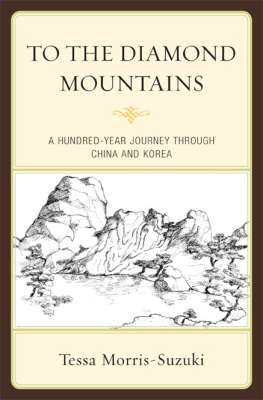First published in 1988 by
Kegan Paul International
This edition first published in 2011 by
Routledge
2 Park Square, Milton Park, Abingdon, Oxon, OX 14 4RN
Simultaneously published in the USA and Canada
by Routledge
711 Third Avenue, New York, NY 10017
Routledge is an imprint of the Taylor & Francis Group, an informa business
Tessa Morris-Suzuki 1988
All rights reserved. No part of this book may be reprinted or reproduced or
utilised in any form or by any electronic, mechanical, or other means, now
known or hereafter invented, including photocopying and recording, or in
any information storage or retrieval system, without permission in writing
from the publishers.
British Library Cataloguing in Publication Data
A catalogue record for this book is available from the British Library
ISBN 10: 0-7103-0293-2 (hbk)
ISBN 13: 978-0-7103-0293-9 (hbk)
Publishers Note
The publisher has gone to great lengths to ensure the quality of this reprint
but points out that some imperfections in the original copies may be
apparent. The publisher has made every effort to contact original copyright
holders and would welcome correspondence from those they have been
unable to trace.
List of Tables
Acknowledgements
The individuals and organisations who have helped me with this study are so numerous that it would be impossible to name them all. Particular thanks, however, are due to Professors Seiyama Takur and Tahara Eiichi of ita University, at which I held a visiting research fellowship while gathering material for this book. I was concurrently a visiting researcher at the Kysh Keizai Chsa Kykai, and my thanks go to Mr Imamura Akio and to all the staff of that institution for their assistance and hospitality. I am grateful to Messrs Koizuka Fumihiro of the Mainichi Newspapers, Watanabe Eiki of the Japan Socialist Party, and Shimomichi Naoki of the Shakai Shimp, and to Ms Murota Yasuko of the Asahi Shimbun for their help in arranging the interviews upon which sections of this book are based; and, as always, to Messrs Shimamoto Shji of Shogakkan Publications, Toshikawa Takao of Korea Report and Ogawa Taku of Eva Press International for their unfailing assistance and kindness.
The University of New England provided financial support for my research, and my colleagues in the Economic History Department have given continual support and encouragement, and occasional light relief. Mrs Judith Dodd and Mrs Naomi Bell gave invaluable help in typing a sometimes difficult manuscript.
I could not conclude without acknowledging a deep debt of gratitude to the late Professor Ron Neale, with whom I discussed many of the ideas contained in this book, but with whom, sadly, I shall not be able to discuss its final form.
Note: Names in this text are given in the normal Japanese order: family name first and given name second, except in quoted references where the western order is used in the original.
1 Introduction
In recent years, an unceasing stream of books, newspaper articles, conferences and television programmes have drawn our attention to profound technological changes which are transforming the structure of the world economy. The automation of factory and office work is increasing; communications networks are being radically reshaped; new areas of productive knowledge such as biotechnology and artificial intelligence are being developed; information-based industries are expanding. Some writers have welcomed these developments as ushering in an age of greater affluence, leisure and intellectual creativity, while others see them as posing profound threats to economic welfare and to political freedom; but almost all agree that they are changes whose implications we ignore at our peril.
From these writings, two important themes emerge. The first is that we are in the midst of an information revolution, whose outcome will be the emergence of an information age or information society. At a conference on the topic held in 1983, for example, the British Minister of Science and Technology, Kenneth Baker, told his audience that technology today is changing faster than ever before and no area more so than information technology. In turn, this promises to change society every bit as radically as the industrial revolution of the nineteenth century,
Since that date, a growing number of governments have certainly turned their attention to various issues identified under the rubric of the information revolution. But what is the information revolution; what is an information society? Daniel Bell, perhaps
By contrast with the traditional Marxian view of socio-economic development, which predicted a transformation from capitalism to socialism, Bell identifies a number of changes at work in all industrialised societies, whether capitalist or socialist. The most important of these are seen as being the growing bureaucratisation of society and the associated dominance of a rationalist, science-based, technocratic ethos. These developments are linked to a metamorphosis in the nature of economic activity, which, in Bells words, is becoming less a game against nature than a game between persons.
In practice Bells vision of the information society embraces the growing role of organised theoretical research in industry, the increasing importance of information as a source of value, the shift of employment from agriculture, industry or services to the information sector, the computerisation of society and the fusion of computer and communications technology. Yet, although it can be agreed that these are all important elements in contemporary economic and social change, the precise way in which these elements relate to one another remains obscure. As one United States academic puts it: whether knowledge led to computer development or computers led to a preponderance of information is difficult to conclude; they seem caught up in a circle and dependent on each other.
Indeed, for all the wealth of research on specific aspects of the information revolution, theoretical attempts to grasp and analyse the phenomenon as a whole remain few and far between. We ourselves, it might be said, seem to be caught up in a circle of change whose origins, dimensions and implications are beyond the scope of our vision.
A second theme common to many writings on the information revolution is that this wave of change is being accompanied by a gradual shift in the centre of gravity of economic activity away from the old industrial cores (the United States in particular) and towards new centres of dynamism, most notably Japan. It is, indeed, no coincidence that the term information society was itself coined in Japan.















